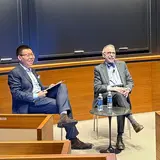
'Money Changes Everything’, by William Goetzmann
A global history of money looks beyond bubbles, crashes and bailouts to argue that finance has been indispensable to progress for millennia
Review by Pietra Rivoli, Financial Times
A search on Amazon for the phrase “changed everything” reveals that everything changed everything. Among the book titles claiming that one particular slice of the universe had such an all-pervasive impact are works on — to name a few — Isaac Newton, air conditioning, Jesus, the Apple Macintosh, the Gatling gun, baby boomers and Minecraft.
Into this crowded field comes Money Changes Everything (subtitle: How Finance Made Civilization Possible) by Yale University finance professor William Goetzmann. Thankfully, Goetzmann does not appear to be motivated to live up to the hyperbolic title. This is a work of measured claims and meticulous research with a focus on finance as a “co-factor” in the advance of moral and material progress.
Societies have long faced a common set of problems, and technology develops to address them. To move things through space we devised wheelbarrows and aeroplanes; to move sound we invented telephony and MP3s. Goetzmann’s insight is that finance, too, is a “movement” technology: we sometimes need to move money forwards (for example, to save for retirement) and sometimes backwards (to invest or consume). Like other technologies, finance is sometimes disruptive and has increased in complexity over time.
Money Changes Everything is a global history of this technology, with a focus on the ancient near east, classical Greece and Rome, China through the Song dynasty, and medieval and modern Europe. Athenian democracy, the Roman empire, and the “Great Divergence” in which Europe pulled ahead of Asia in the 1700s are but a few examples of developments in which finance played a role in cascading change.
Most universities today pay lip service to “interdisciplinary” research but the forces keeping scholars in their silos are strong. True interdisciplinary scholarship is rare partly because it requires the researcher to speak multiple languages with native fluency. If one has grown up speaking economics, one can never speak native sociology, or vice versa.
Goetzmann’s treatment of financial history is remarkable in its sure-footedness outside his home discipline: he seems equally at home in the modern glass structure of the Yale School of Management and the Yale Babylonia Collection a 10-minute walk away. The reader soon learns how he manages fluency of such breadth: as a young man Goetzmann participated in archaeology digs, studied art history and cavorted with specialists in cuneiform writing — in other words, he grew up multilingual. Money Changes Everything appears to tie together a lifetime of diverse interests.
One result of Goetzmann’s multiple fluencies is his ability to guide us through — and make relevant — seemingly arcane scholarship in diverse fields. We meet experts, for example, in the “fiscal archives from the Catalonian count-kings from 1151 to 1213” and learn of their larger significance. One of Goetzmann’s stated aims is to illuminate the process of scholarly discovery in financial history, and here he succeeds admirably. He is able to crystallise the debates that continue (did writing first evolve to record debts?) and those that are settled (the origins of the modern corporate form — marketable shares and separable ownership and control — appear to be Roman). For the general reader, Goetzmann’s treatment of this diverse scholarship is ideally positioned, accessible but not simplistic.



